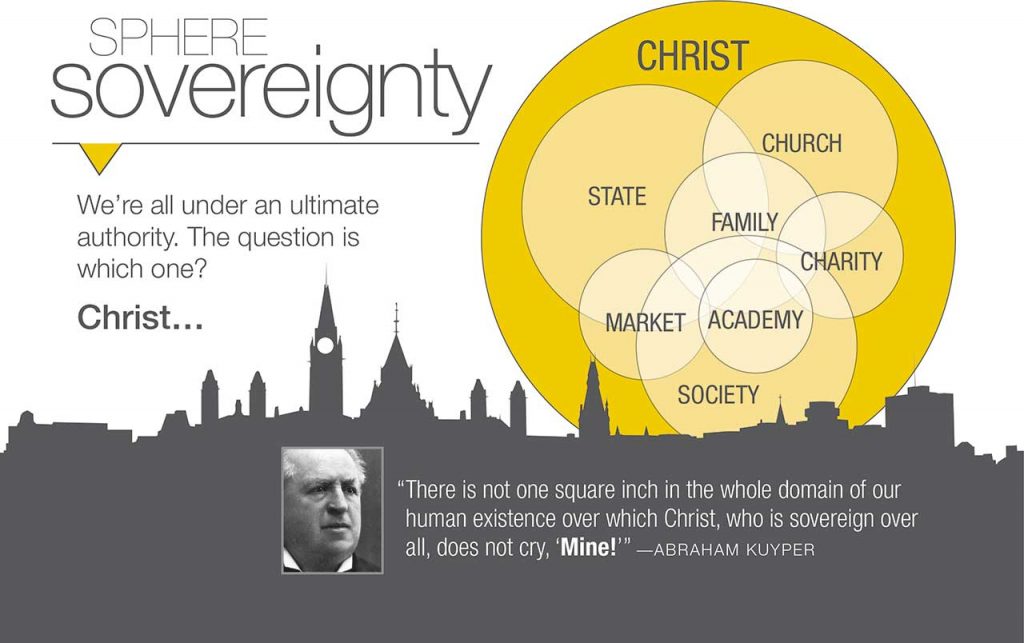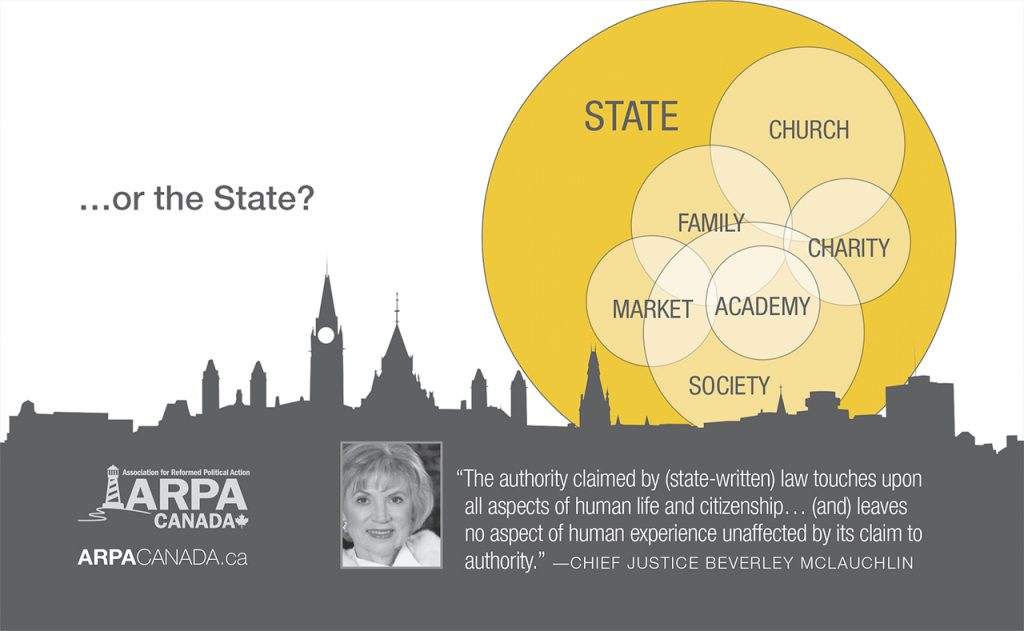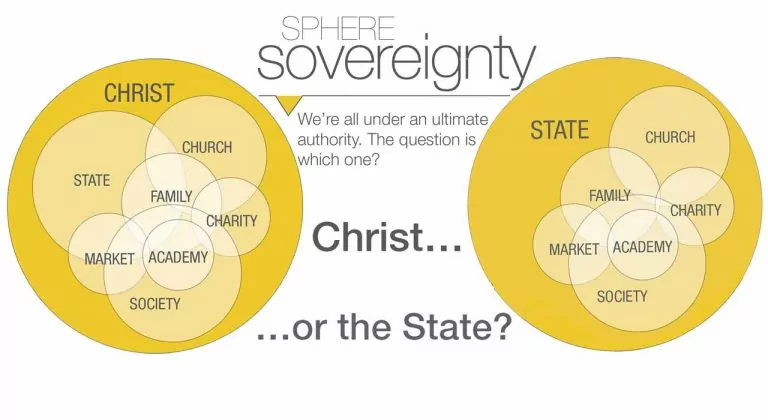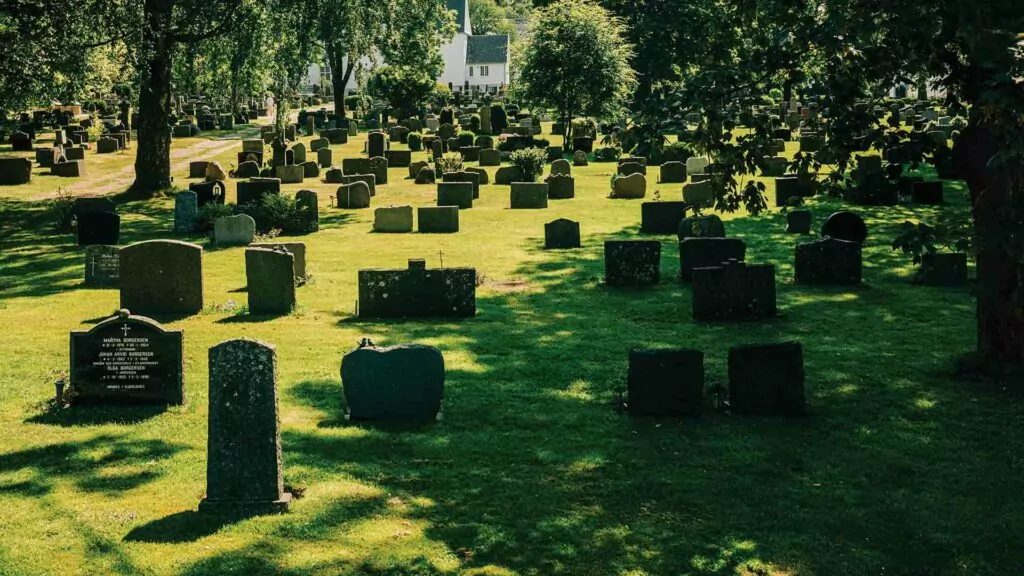Children are often told to obey many different folks. Listen to your mom and dad. Listen to the policeman. Listen to your teacher. Listen to the pastor. Adults too are encouraged to obey various authority figures. Which raises a question: what happens when demands of the State and demands of other authorities clash? Whom do we obey?
The Dutch philosopher, theologian and prime minister Abraham Kuyper developed a system of thought to assist in understanding the authority structures in the world. The system is called “sphere sovereignty” and it helps answer the question, “Who do we obey when various demands on us and our behavior clash?”
GOD OVER ALL
Kuyper argued and demonstrated from the Bible that God has created in society a number of different institutions or spheres, each with their own respective roles and responsibilities. Three of the most important institutions created by God are:
- the CHURCH– starting with Adam, and continuing through Noah, Abraham, the people of Israel and the New Testament church
- the STATE– whose role is set out in various places including Psalm 72 and Romans 13
- the FAMILY – begun with Adam and Eve
In the Bible, God gives each of these spheres a distinct task and role. So, for example, the sphere of State is sovereign in matters properly within its jurisdiction as given and defined by God. Some of those matters would include criminal law, national defense, and maintaining a fair and impartial justice system.
The sphere of Church (or synagogue/mosque/temple/monastery, etc.) is sovereign over areas within its jurisdiction: theology and doctrine and church discipline and membership.

And within the sphere of family lies responsibility for issues of child education and discipline, religious instruction, sexual ethics, moral development, etc.
In the graphic accompanying this article, you’ll notice other spheres: a larger sphere of Society and smaller spheres which are each sovereign in their own right: the market, the academy, charities and the individual. Academics will argue over how many separate spheres there might be, but while the number and boundaries of the smaller spheres is a source of debate, there is agreement about the obvious biblical basis for the first three. God has instituted the Church, the State and the Family and invests each with its own specific sphere of authority.
There is, of course, some overlap from sphere to sphere. Fraud can’t be limited to the market sphere; it requires the State criminal law power to protect the consumer. Physical assault of a child can’t be limited to the family sphere; it requires the State criminal law power to protect the child. Restorative justice can’t be limited to the State sphere; it requires the family sphere and the church sphere to mend broken relationships.
However, there are also boundaries between the spheres. These boundaries are critical. History has taught us that great harm can be done when one sphere takes over the role of another. For example, problems abound when the State interferes in church doctrine issues. This was the greatest problem during the bloody Reformation era. The State used the sword to enforce church doctrine, which was a total abuse of its power, and a violation of the principles of sphere sovereignty. A modern example would be the Ontario human rights tribunal ordering a Roman Catholic bishop to explain himself to the Tribunal for not allowing an openly gay man to serve as an altar boy (this occurred in Peterborough, Ontario in September 2009). A similar violation of the boundaries between the spheres happened when the Ontario Minister of Education, standing outside the Ontario Legislature, declared that Christian schools could not teach that abortion is wrong, since such a teaching was “one of the most misogynistic actions that one could take.” (That statement was made by Minister Broten in October, 2012.) And in the not too distant past, churches and families tried to keep certain criminal acts (child abuse, for example) quiet and internal, when it ought to have been reported immediately to the State.
Having shown the boundaries that exist between these spheres, we need to turn our attention to the key of Kuyperian sphere sovereignty: over each and every sphere reigns Christ as sovereign. Kuyper’s famous saying applies here: “There is not one square inch in the whole domain of our human existence over which Christ, who is Sovereign over all, does not cry, ‘Mine!’”
As a Christian country, we once recognized this, and it wasn’t even that long ago. The preamble to the Charter of Rights and Freedoms (added to our Constitution in 1982) still states, “Whereas Canada is founded upon principles that recognize the supremacy of God and the rule of law…” Recognizing the supremacy of God is necessary in public policy because, when we fail to do so, someone or something else will take God’s place as supreme authority.
THE STATE/LAW OVER ALL
For example, take a look at the concept of sphere sovereignty through the eyes of our former Chief Justice, the Right Honorable Beverley McLauchlin. We can see in some or her statements a recognition that there are some spheres in life which are distinct: the sphere of society, spheres of religious communities and families and the sphere of the State. But we should take careful note of where, in her mind, the State sits in relation to the other spheres. In a speech delivered in October 2002, Her Honor stated that:
the rule of law exerts an authoritative claim upon all aspects of selfhood and experience in a liberal democratic state… influenc[ing] local, community, and familial structures. The authority claimed by law touches upon all aspects of human life and citizenship… It makes total claims upon the self and leaves little of human experience untouched.

These “total claims” on us as legal subjects, she said, “flow from a conception of authority rooted in the sovereign [State].”
Invoking Kuyper, one could paraphrase what the Chief Justice said in this way: “There is not one square inch in the whole domain of our human existence over which the Law, which is sovereign over all, does not cry, ‘Mine!’”
Admittedly, Her Honor does believe that Law must carve out space for religious communities to live according to their particularities. However, it’s Law (and the State, as the authors of the Law) who makes space and accommodations for religion. For our chief justice, law remains the supreme authority. So there remains a tension between the Law of the State and religious precepts, familial obligations, and individual responsibilities.
THE ROAD TO TYRANNY
Without something (or, more properly, Someone) over all spheres, tension breaks out between the spheres, and a struggle ensures to see which sphere will reign as supreme.
Now, of all of the spheres (the State, the Church, the Family, the Market, etc.) which has the most power? Quite obviously, the State does. As the Apostle Paul once wrote, it “bears the sword.” It has unlimited financial resources, it has coercive powers, it writes the laws, and it has lethal force. So, if God is removed as sovereign, who becomes sovereign? The State does. This is absolutely evident in every officially atheist country from the last century: the USSR, China, North Korea, Nazi Germany, Fascist Italy.
When the State raises itself above God, then God becomes a problem for the State. And know this: as the State replaces God, or makes itself god, then it naturally also begins to compete with the family, substituting itself for the family. (It’s no coincidence that the leader of North Korea is referred to as “father.”) And when we, free citizens in a free country, begin to think that the State will provide everything for us, not just national defense or a fair justice system (as it ought to) but also total healthcare, education, food, clothing and shelter, unemployment wages, settlement of petty disputes with our landlords and employers, and on and on, then we are looking to the State not just as god, but also as savior.
Lord Acton once wrote, “Power tends to corrupt and absolute power corrupts absolutely.” That dictum is true for all of mankind because of our innate sinfulness and our covetous lust for more. This may be why the LORD never allowed all three offices of the Old Testament to be vested in a single person, though there were exceptional cases where a single person was both a prophet and a priest. Think, for example, of the punishment of King Uzziah when he tried to act as priest and burn incense before the Lord (2 Chronicles 26). Applying this anecdotal evidence for division of power to our civil government, we see a three-fold division of power there too, between the judiciary, legislature, and executive. The Canadian Constitution holds all three branches of government in check – each have power to limit the powers of the other. But if that balance is ever upset such that one person (or one small group of people) becomes lawmaker and law interpreter and law enforcer, we will have tyranny.
Expanding out from the Biblical offices and expanding out from civil government, we see that there is a natural protection against tyranny in the dispersion of power. Lord Acton also wrote, “Liberty consists in the division of power. Absolutism, in concentration of power.” So we see that for mankind’s good, God gives some power to the church, some power to families, and some power to the State. But if the ultimate power concentrates (as it is tending to do these days) in one of these spheres, we also have tyranny. One example would be in the realm of education: God gives authority over education of children to parents, with the church assisting parents in that calling historically. But in the last century, the State took over, first from the church, and now more and more from parents, such that even the most intimate and personal educational material is being taught by State bureaucrats, often without parents knowing (think of some of the graphic sex education curriculum for grade 3 and 4).
REMINDING OUR NEIGHBORS OF GOD’S PLACE
One of our responsibilities as Christian citizens in a free country is to keep the State in its proper place, and to remind fellow citizens of what their responsibilities are apart from the State. This is where you come in. Use the graphics in this article to show your friends and colleagues that we all must be under some ultimate authority. The question is simply, which one? Are we willing to submit ourselves fully to the State? Isn’t the Lordship of Christ infinitely better?
We must remind our fellow citizens of what their responsibilities are apart from the State, and explain to them the effect of subjecting everything to the ultimate authority of the State – it means losing the freedom to live as we ought to live. Failure to understand this important concept means subjecting our institutions, our businesses, our families, our churches, subjecting even our very selves to the sovereign will, not of God, but of the State.
So, to answer the question I posed at the beginning of this philosophical discussion – who do we obey when demands of the State and demands of parents or pastors or professors conflict? The answer is: it depends. It depends on whether the parents or the professors or the pastors or the State are authoritative in the sphere in which they are making the demands.
This approach to understanding the very limited authority of the State should not be interpreted as a proposal for anarchy. I once swore an oath of allegiance to the country I love, my Canada, an oath which I stand by to this day. I pray for her leaders every day. I strive to obey all her laws.
But here’s the rub: when those in power begin to legislate in areas over which they have no jurisdiction, my trust in the government plummets. And when those in power dare to legislate in such a way that I must either obey the State’s law or violate my conscience, then I say loudly with the Apostle Peter, “I must obey God, rather than men.”
One key to a free, prosperous, democratic society is for the State to back off from taking authority unto itself that was not its to begin with, to not arrogate unto itself powers which are not its own. When the State learns restraint, we can and do enjoy freedom. When our society and culture recognizes a Sovereign high above the State, as we once did, then we certainly will enjoy freedom.
This article first appeared in the November 2014 issue under the title “Whom do you serve? Sphere Sovereignty and the need for limits on power.” Illustrations were created by Lynn VanEerden. André Schutten is the Director of Law and Policy for ARPA Canada.
POSTSCRIPT: QUESTIONS TO CONSIDER
While sphere sovereignty is a helpful tool, like any other tool it has limitations. For example, while the first three “spheres” of Church, State and Family are quite clearly instituted by God, we could have endless debates about just how many other spheres there might be. In Canada we could list the federal government as one sphere, and the provincial governments as another, but what about towns and cities? Do they get their own sphere? Is Academia a sphere? What about the Market? Also, while the spheres are a helpful concept, defining the exact borders between each of them is hard to do. So the author wants to emphasize that this is not meant to be the Reformed paradigm through which Christians ought to view the world, and he welcomes feedback on the ideas expressed here.
- What is helpful about this model, and how might it be improved?
- André Schutten talks about the sphere of the Church as separate from Family and State. Where does a mosque, synagogue or temple fit in? God instituted the State, the Church, and the Family, but did He institute the mosque? We don’t think the State should interfere with mosques, synagogues and temples so they do seem to exist in a separate sphere apart from the State, but is that separate sphere grouped with the Church, or is it, perhaps, under the Family? Or might it be something else entirely?
- In Western countries it often seems the State that is trying to take Christ’s supreme position. What might the interloper be in countries like Saudi Arabia or Iran? And if a libertarian were going to make their own sphere sovereignty model, who would they put in place of Christ?














